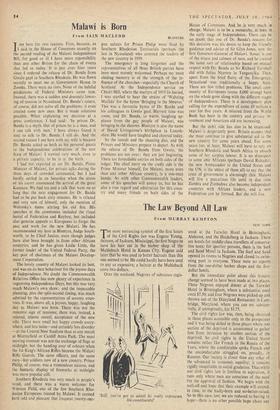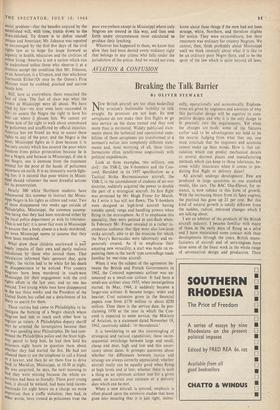The Law Beyond All Law
From MURRAY KEMPTON
NEw VORK THE most entrancing symbol of the first hours of the Civil Rights law was Eugene Young, thirteen, of Jackson, Mississippi, the first Negro to have his hair cut in the barber shop of the Muhlebach Hotel in Kansas City. Eugene said later that be was used to better haircuts than this one seemed to be. He could hardly have been used to any so expensive; a haircut at the Muhlebach costs two dollars.
Over the weekend, Negroes of substance regis- 'Still, you've got to admit really represents
his constituents!'
tercd at the Tutwiler Hotel in Birmingham, Alabama, and the Heidelberg in Jackson. These are hotels for middle-class travellers of conserva- tive taste; for sportier persons, there is the Surf. and Sand Motel in Jackson. The Surf and Sand opened its rooms to Negroes and closed its swim- ming pool to everyone. There were no reports from the one-dollar barber shops and the five- dollar hotels.
But the immediate point about this historic change seemed to have been made at two places. Three Negroes enjoyed dinner at the Tutwiler Hotel in Birmingham, where a substantial meal costs $7.50; and four Negroes were picked up and thrown out of the Dizzyland Restaurant in Cam- bridge, Maryland, where you can cat substan- tially, if uninspiredly, for $1.75.
The civil rights law was, then, being observed in those places accessible only to the prosperous and it was being defied in those places where one section of the deprived is accustomed to gather free from intrusion by another section of the deprived. So civil rights in the United States remains rather like French in the Russia of the Tsars, where the comfortable spoke French and the uncomfortable struggled on, proudly, in Russian. Our society is closer than any other of the advanced to economic equality; it remains rigidly inequitable in social gradation. Thus while our civil rights law is limitless in aspiration, it runs only where men are conscious of the need for the approval of fashion. We begin with the well-off and hope that their example will extend, in time, to the badly-born and no-better-raised. So in this case, too, we are reduced to having to hope—there is no other possible hope about any
social problem—that the benefits enjoyed by the established will, with time, trickle down to the disestablished. To dream is to define oneself Unique and American; Mr. Johnson was reported SO encouraged by the first five days of the civil rights law as to hope for leaps forward as eigantic in health, education and the civilities of Urban living. America is not a nation which can be understood unless those who observe it at a distance accept the condition that Mr. Johnson, aS an American, is a Utopian, and that whichever fourteenth Either/Or may be the Queen's First Minister must be crabbed, pinched and narrow beside him.
Still, here as everywhere, there remained the fact of class. The fact of class was what the events in Mississippi were all about. We have tried by law—we may even have succeeded in life—to assure the Negro the right to have his hair cut where it pleases him. We cannot yet assure him of the right to walk about unmolested by policemen and unaffiicted by official injustice. America has yet found no way to assure these rights to any of the poor, and the Negro is the Poor; Mississippi fights as it does because it is the only society which has assured the poor white freedom from police prosecution because he is not a Negro, and because in Mississippi, if one is not Negro, one is immune from the treatment normal for the poor at the hands 6f policemen anYwhere on earth. It is an immunity worth fight- mg for; it is natural that poor whites in Missis- 4Pi should volunteer the most dreadful actions for its preservation.
Nearly 300 white Northern students have volunteered this summer to instruct the Missis- sippi Negro in his rights as citizen and voter. Two of them disappeared two weeks ago outside of Philadelphia, Mississippi, the common assump- tion being that they had been murdered either by the local police department or with its tolerance. That is not fair; it is never fair even in Mississippi to assume that a body absent is a body murdered; Yet even Mississippi seems to assume that they have been murdered.
What drew these children southward is part lonely impulse of their own and partly realistic Calculation by those who invited them. That ealculation informed their sponsors that, quite simply, the victim had to be white for his death Or disappearance to be noticed. Five country Negroes have been murdered in south-west Mississippi for their engagement with the civil rights effort in the last year, and no one has noticed. Two young white men have disappeared in the last three weeks, and the President of the United States has called out a detachment of his Navy to search for them.
These victims had come to Philadelphia to in- vestigate the burning of a Negro church where Negroes had met to teach each other how to register as voters. A Philadelphia deputy sheriff says he arrested the investigators because their ear was speeding near Philadelphia. He had sum- tnoned the Philadelphia police and the State high- WaY patrol to help him; he had then held his Prisoners eight hours to question them about Whether they had started the fire. He had not allowed them to use the telephone to call a friend a lawyer, and then he set them free to drive aok to Meridian, Mississippi, at 10.30 at night. qe was surprised, he says, the next morning to find they were missing because the whole ex- Perience had been so friendly. These poor young trten, it should be noticed, had been held incom- Municado for eight hours on a charge no more important than a traffic violation; they had, in °tiler words, been treated as policemen treat the
poor everywhere except in Mississippi where only Negroes are treated in this way, and then sent forth under circumstances most calculated to produce their lynching.
Whatever has happened to them, we know that alive they had been denied every ordinary right that belongs to any citizen who falls under the jurisdiction of the police. And we would not even
know about these things if the men had not been strange, white, Northern, and therefore eligible for notice. They were extraordinary, but their treatment was ordinary for country Negroes. We cannot, then, think profitably about Mississippi until we think intensely about what it is like to be an ordinary poor Negro there, and to be the sport of the law which is quite beyond all laws.











































 Previous page
Previous page